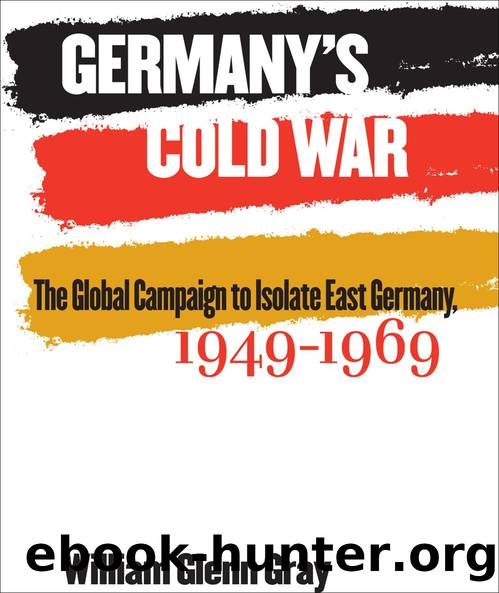Germany's Cold War by William Glenn Gray

Author:William Glenn Gray [Gray, William Glenn]
Language: eng
Format: epub
Tags: History, Europe, Germany, Political Science, General, International Relations
ISBN: 9780807827581
Google: rlkIBXM7yNYC
Publisher: Univ of North Carolina Press
Published: 2003-01-15T16:06:16+00:00
Unification Hysteria and Erhardâs Political Demise
Ludwig Erhard was completely unprepared for the storm that rolled over him. In October 1965 he had been reelected by a comfortable margin, and his coalition of CDU/CSU and FDP commanded 294 of 496 seats in the Bundestag. With the election season past, however, pending issues could no longer be deferred. Unification in particular was on the agendaâthanks in no small part to expectations the chancellor himself had aroused during his first two years in office. Polls in 1965 suggested that among the major concerns of West Germans, the problem of unity had moved to the top of the list.111 âAfter the election, however it turns out, the German Question will become the dominant theme,â wrote one CDU foreign policy expert to Henry Kissinger in April 1965. âThinking in the Federal Republic is in flux. ⦠Strange as it sounds, the annoyance with Egypt over the Ulbricht visit has helped push in this direction. The feeling has grown that the German position is vulnerable.â112 This prediction by Johann Baptist Gradl proved accurate. The postelection period yielded an explosion of publications along the lines of W. W. Schützâs Rethinking German Policy, which called on West Germans to undertake genuine sacrifices for the sake of national unity. The British ambassador was unimpressed by the agitated discussion in Bonn: âMost of it is no more than froth.â113 But it was Erhardâs inability to keep up with the rapidly shifting debate that branded his administration as hopelessly wooden and behind the times.
At the root of West German anxieties lay a shift in perspective about the staying power of Ulbrichtâs regime. With the New Economic Program running in high gear, the GDR was experiencing robust growth on the order of 5 percent per annum. Some spoke of a âsecond economic miracleâ on German soil parallel to the Federal Republicâs rapid expansion in the 1950s.114 In light of the crass exploitation this portion of Germany had earlier suffered at the hands of the Soviet occupiers, the GDRâs record seemed all the more impressive. Erich Mende, Bonnâs minister for all-German affairs, remarked on several occasions that the recent progress in the GDR âhas led the people there to take pride in their constructive accomplishmentsâwhich could well develop into a sense of separateness or at least an acceptance of the regime.â115 This was precisely what many in Bonn feared. Could it be that the population of East Germany was coming to terms with the SED dictatorship? If so, what did this entail for West Germanyâs long-heralded goal of unification? Was the German Reich fashioned by Bismarck just a passing historical episode, one that could never be re-created through the adjoining of East and West Germany?116 Journalists and publicists speculated that the GDR might one day be seen as a foreign entity that happened to share certain cultural traits with the Federal Republicâmuch like Austria and Switzerland.
For the generation then dominant in Bonn, which attached great significance to the goal of national unity, these were truly appalling scenarios.
Download
This site does not store any files on its server. We only index and link to content provided by other sites. Please contact the content providers to delete copyright contents if any and email us, we'll remove relevant links or contents immediately.
Room 212 by Kate Stewart(5091)
The Crown by Robert Lacey(4791)
Endurance: Shackleton's Incredible Voyage by Alfred Lansing(4743)
The Iron Duke by The Iron Duke(4336)
The Rape of Nanking by Iris Chang(4189)
Joan of Arc by Mary Gordon(4080)
Killing England by Bill O'Reilly(3987)
Say Nothing by Patrick Radden Keefe(3964)
I'll Give You the Sun by Jandy Nelson(3415)
Shadow of Night by Deborah Harkness(3341)
Hitler's Monsters by Eric Kurlander(3320)
Mary, Queen of Scots, and the Murder of Lord Darnley by Alison Weir(3189)
Blood and Sand by Alex Von Tunzelmann(3181)
Eleanor & Park by Rainbow Rowell(3139)
Darkest Hour by Anthony McCarten(3112)
Margaret Thatcher: The Autobiography by Thatcher Margaret(3065)
Book of Life by Deborah Harkness(2913)
Red Famine: Stalin's War on Ukraine by Anne Applebaum(2909)
The One Memory of Flora Banks by Emily Barr(2847)
